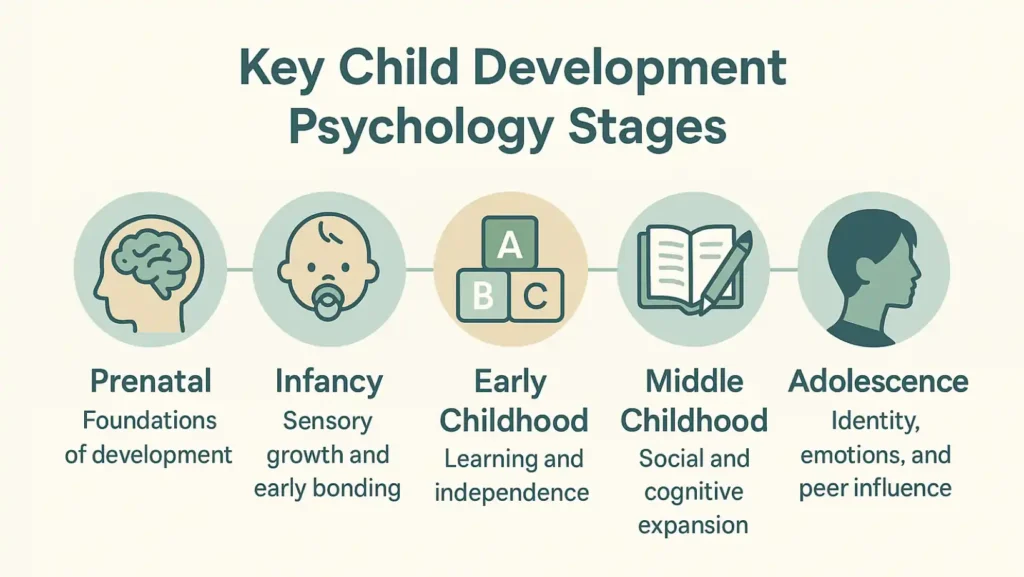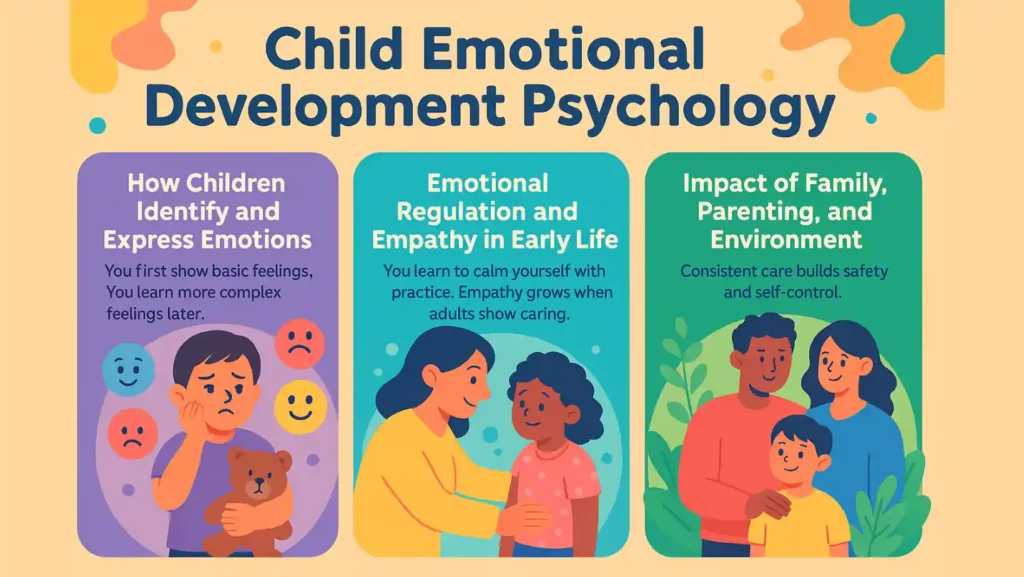Child development psychology explains how you grow from before birth to your teenage years. It studies how your brain, feelings, and social skills form. It shows what helps healthy growth. It names typical steps. It points out risks and provides support to help you thrive.
Table of Contents
ToggleWhat Is Child Development Psychology?
Definition and scope of developmental psychology
Child development psychology looks at mental, emotional, social, and language change. It tracks milestones you reach. It asks when skills appear and why. It covers birth to adolescence. It helps caregivers and teachers make smarter choices.
Importance of studying child behavior and growth
You learn what is normal and what is not. Early help prevents long-term problems. Studying growth guides parenting, school plans, and health care. It helps you spot issues early and act fast.
How child development differs from adult psychology
Children change faster than adults. Their brains form basic patterns early. Their needs are different. Your choices as a caregiver shape their learning and emotions. Treatment and teaching must match the age.
Major Theories in Child Development Psychology
Piaget’s cognitive development theory
Piaget said children think in stages. Babies sense and act first. Later, they use words and ideas. You see simple logic in middle childhood. Teenagers form abstract ideas. His theory helps you expect certain skills at certain ages.
Erikson’s psychosocial development stages
Erikson named the social tasks at each age. Infants learn trust from care. Toddlers learn independence from safe choices. School-age children find competence through work. Teens build identity. Each stage asks for support.
Freud’s psychosexual stages of growth
Freud linked early family life to later traits. His ideas focus on early drives and care. Modern science uses his work with caution. Still, his view pushed the study of early years.
Bandura’s social learning theory
Bandura showed that you learn by watching others. You copy adults and peers. Praise or correction changes behavior. Positive role models teach strong habits. This theory explains how you pick up social skills.
Bowlby’s attachment theory and emotional bonding
Bowlby found that early bonds shape security. Secure care lets you explore safely. Weak bonds raise anxiety risk. Attachment affects friendship and trust later.
Key Child Development Psychology Stages
Prenatal Stage — Foundations of Development
Before birth, your brain and body form. Nutrition and health matter a lot. Stress and toxins can harm growth. Early care in pregnancy helps brain wiring. Simple steps boost long-term health.
Infancy — Sensory Growth and Early Bonding
Babies learn with eyes, ears, and touch. Bonding with caregivers builds trust. You learn to calm down and play. Motor skills start. Language begins with sounds and mimicry.
Early Childhood — Learning and Independence
You gain words fast. Play teaches cause and effect. You test limits and learn self-help skills. Adults guide with small choices. Independence grows through safe challenges.
Middle Childhood — Social and Cognitive Expansion
School adds rules and tasks. You form friendships and follow group norms. Thinking becomes more logical. You plan and solve simple problems. You learn to read and work with others.
Adolescence — Identity, Emotions, and Peer Influence
Teens form their identity and values. Emotions feel stronger. Friends shape choices more than before. You try new roles and plan for the future. Guidance helps you make safe decisions.
Areas of Child Psychological Development
Physical Development — Growth, Motor Skills, and Health
Your body grows steadily. Fine motor skills let you write. Gross motor skills let you run and jump. Sleep and nutrition support learning. Health checks track growth and prevent problems.
Cognitive Development — Memory, Reasoning, and Learning
Thinking skills grow step by step. Memory and attention improve with practice. You move from concrete thought to abstract reasoning. Learning builds with reading, talking, and guided practice.
Emotional Development — Understanding Feelings and Empathy
You learn to name emotions. You learn to calm yourself. Empathy grows from caring relationships. Adults who name feelings help you feel understood and safe.
Social Development — Interaction, Friendships, and Cooperation
You learn to share, take turns, and solve conflicts. Play creates social rules. Team tasks build cooperation. Good social skills make school life easier.
Language Development — Communication and Expression
Speech starts with sounds and grows to full sentences. Reading boosts vocabulary and thought. Talking often with adults helps you think and learn.
Child Cognitive Development Psychology
How Children Process Information and Solve Problems
You use senses, trial and error, and then planning to solve problems. Repetition and guidance strengthen skills. You learn faster with clear steps and feedback.
Cognitive Milestones by Age Group
Infants follow faces and sounds. Toddlers combine words. School children solve logic tasks. Teenagers think about ideas and consequences. Milestones guide what to teach next.
The Role of Play in Cognitive Growth
Play is serious work for the brain. Pretend play builds imagination. Puzzles sharpen logic. Group games teach rules and planning. You learn best by doing.
Child Emotional Development Psychology
How Children Identify and Express Emotions
You first show basic feelings. You learn more complex feelings later. Adults who name your feelings help you make sense of them. This lowers tantrums and fear.
Emotional Regulation and Empathy in Early Life
You learn to calm yourself with practice. Caregivers model calm. Small routines help you manage stress. Empathy grows when adults show caring. Skills improve with age and guidance.
Impact of Family, Parenting, and Environment
Consistent care builds safety and self-control. Conflict and chaos harm emotional growth. Stable routines and clear limits help you trust and learn.
Child Social Development Psychology
Peer Influence and Social Identity Formation
Friends shape how you act and what you value. You try new behaviors to fit in. Positive peer groups teach kindness and teamwork. Adults must watch peer effects.
Importance of Attachment and Social Learning
Secure attachment gives you the courage to try new things. You copy speech and manners from adults. Good role models teach habits better than words.
Building Communication and Cooperation Skills
You learn to listen and speak by practice. Role play and group tasks teach sharing and solving problems. Praise effort in cooperation, not just being perfect.
Factors Influencing Child Development
Genetic and Biological Influences
Genes set some traits and risks. Birth events can affect brain wiring. Early health care limits harm from birth issues. You are shaped by both genes and experience.
Family Environment and Parenting Styles
Warm, consistent parenting builds confidence. Clear limits help you learn right from wrong. Neglect harms learning and emotion. Supportive homes make big differences.
Socioeconomic Conditions and Access to Education
Resources affect food, books, and school quality. Poverty can slow learning. Community support and good schools help reduce gaps.
Cultural and Societal Factors Shaping Behavior
Culture sets expectations for behavior and goals. It influences play, sleep habits, and school values. Respecting culture helps support children well.
Technology and Digital Exposure in Modern Childhood
Screens can teach but also distract. You should limit screen time for young children. Choose apps that promote activity and thinking. Balance digital use with play and sleep.
Child Development Psychology Challenges
Developmental Delays and Learning Disabilities
Some children learn more slowly in speech or movement. Early checks spot delays. Targeted teaching and therapy improve skills. Timely help reduces future struggles.
Emotional or Behavioral Disorders (ADHD, Anxiety, Autism)
Conditions like ADHD affect focus and behavior. Anxiety makes normal tasks feel unsafe. Autism changes social and communication skills. Diagnosis leads to tailored support.
Family Conflict, Neglect, and Trauma
Family conflict and trauma raise stress and change brain responses. Stable care and therapy reduce long-term harm. Safety and routine matter most.
Cultural or Social Adaptation Issues
Moving or changing schools brings stress. Language gaps slow learning. Supportive teaching and friendly peers ease adaptation. Adults must respond with patience.
Identifying Early Warning Signs of Developmental Issues
Missed milestones may signal concern. Little speech after two years, poor eye contact, or extreme behaviors need review. Early screening helps you act fast.
Diagnosing and Supporting Child Development Issues
How Developmental Psychologists Assess Growth Patterns
They use observation, play, and interviews. They compare milestones to age norms. Tests measure language, motor, and social skills. Reports guide next steps.
Common Child Psychology Assessment Tools
Screeners check likely delays. Standard tests measure language and thinking. Behavior checklists gather parent and teacher notes. Results form a plan.
Role of Parents and Educators in Diagnosis
You know daily behavior best. Teachers add classroom views. Clinicians combine all input to find causes and solutions. Teamwork improves support.
Early Intervention Programs and Therapy Options
Speech therapy improves language. Occupational therapy builds daily skills. Behavior therapy teaches new habits. Early support gives lasting gains.
How to Foster Healthy Child Development
Encouraging Emotional Expression and Resilience
Name feelings with the child. Let them practice calming steps. Praise effort and trying new things. Show patience during mistakes.
Supporting Learning Through Play and Exploration
Give time for play every day. Provide safe toys and books. Ask open questions to boost thinking. Read together often.
Setting Routines and Positive Discipline Techniques
Keep a steady sleep and meals. Use short, clear rules. Teach consequences and keep them fair. Discipline should teach, not punish.
Importance of Parental Involvement and Empathy
Be present and listen. Show interest in school tasks and friends. Empathy builds trust and helps your child grow.
When to See a Child Psychologist
Signs Your Child May Need Psychological Evaluation
Speech delays after age two, little play, or extreme behavior need review. Struggling in school or social isolation also calls for assessment. Trust your instincts.
Common Conditions Child Psychologists Treat
They help with ADHD, anxiety, autism, and learning disorders. They treat trauma and behavior problems. They guide parents with tools and strategies.
What to Expect During an Evaluation Session
Expect play tasks, questions, and teacher reports. The clinician explains findings and suggests a plan. Follow-up helps track progress.
FAQs
What Is The Main Goal Of Child Development Psychology?
The goal is to help you grow in thinking, feeling, and social skills. It aims to spot needs early and guide parents and teachers to support development.
What Causes Developmental Delays In Children?
Delays can come from genetics, birth events, or a lack of early stimulation. Poor nutrition and stress also slow growth. Early checks help find causes.
How Do Emotions Develop In Children?
Children first show basic feelings. Adults name emotions and model calm. With practice, children learn to label feelings and manage reactions over time.
What Factors Influence Social Development?
Family, peers, culture, and school shape social skills. Positive role models and play help you learn cooperation, sharing, and problem-solving.
When Should I Worry About My Child’s Behavior?
Worry if steady progress stops or new severe changes appear. Seek an evaluation for persistent delays, extreme mood swings, or social withdrawal.
How Can Parents Support Cognitive Development?
Talk and read daily. Offer puzzles and play that challenge thinking. Provide steady routines and encourage curiosity and problem-solving through play.
How Does the Environment Affect Child Growth?
Safe, stable homes support learning. Resources like books and good schools matter. Stress and chaos harm emotional and cognitive growth.
About The Author

Medically reviewed by Dr. Chandril Chugh, MD, DM (Neurology)
Dr. Chandril Chugh is a U.S.-trained, board-certified neurologist with expertise in diagnosing and managing neurological disorders, including migraines, epilepsy, Parkinson’s disease, and movement disorders. His clinical focus includes evidence-based neurological care and patient education.
All content is reviewed for medical accuracy and aligned with current neurological guidelines.






